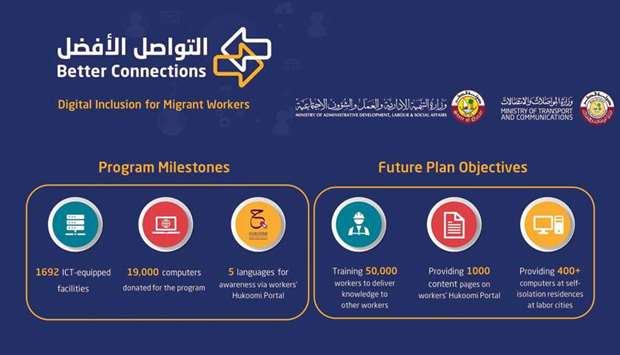The 'Better Connections' programme of the Ministry of Transportation and Communications (MoTC) has improved the lives of expatriate workers by enhancing their well-being and happiness and ensuring digital inclusion.
“The programme has achieved its goals through the contributions of government and private entities to reduce the digital divide and ensure digital inclusion for the expatriate workers segment in Qatar,” the MoTC tweeted.
The programme, according to MoTC figures, provided training for 27,000 'digital champions', who in turn trained their colleagues in the use of computers and access to services, as well as facilitating contact with family and friends in their countries. The 'digital champions', after joining the programme, are able to stay in touch with their families and friends to acquire life skills in the digital world.
“The programme helped me learn how to use email and Facebook. And we chat with our family on Facebook. Now, my mother and I feel like we are together,” said Om Prakash Singh, one of the beneficiaries of the programme.
Mary Ann, one of the volunteers of the programme, said 'Better Connections' is helping the participants stay connected with their families and get information while browsing the Internet. She added that some of them have joined online courses after they became part of the programme.
The initiative is aimed at helping workers improve their lifestyle by using ICT tools and developing their basic skills in the digital world. The programme is raising awareness among migrant workers through the Hukoomi portal in five languages.
Better Connections is a groundbreaking social integration initiative and a public-private partnership between the MoTC, Ministry of Administrative Development, Labour and Social Affairs and committed partners. It provides access to technology and develops the skills of migrant workers in the use of ICT in order to improve their quality of life and to integrate them into the digital community and wider society.
This programme provides free access to refurbished computers and the Internet as well as training for workers in their place of accommodation so that they can become part of the information society, allowing them to communicate with friends and family in their home countries, access government online services, learn about their rights and responsibilities and return to their countries with enhanced IT skills.


